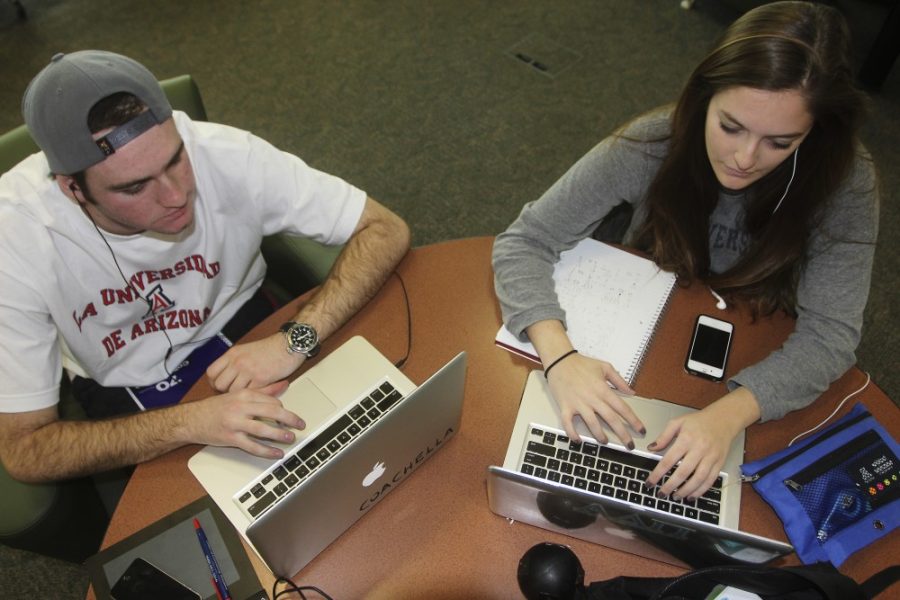Sometimes Helen Nguyen talks to her stuffed animals.
“Like even at home, I would just talk to my stuffed animals, pretending that I’m teaching them, just so I can remember things more easily. Writing isn’t enough,” said Nguyen, a sophomore studying East Asian studies.
When she’s not pretending to tutor her toys, Nguyen charges students $15 an hour for independent tutoring sessions. Teaching others helps her learn as well, she says, and tutoring can be used to help counter the consequences of procrastination.
“I would like to study … in blocks of two or three hours a night but I just can’t get myself to do that. I’m a procrastinator, as many of us are,” said Taylor Robinson, a sophomore studying economics and political science. “No matter what I try to do, it always ends up being that way.”
A 2009 study by the University of Kentucky found college students struggle with frequent procrastination and to complete academic tasks because they often fail to “self-regulate.” In other words, students struggle to manage their time effectively.
“Freshman year, it would’ve been really helpful, I think, if I had a bit more structure, because when you first come to the university, you’re not used to it,” said Hannah Healy, a media arts senior. “You’re kind of dropped in the middle of this huge world and you don’t really know where to begin.”
Though some students pay for tutoring and are satisfied with the results, many students would rather save the little money they have and take advantage of free resources, study on their own or ask friends for help.
“It seems like I have a friend for every subject,” said Joey Vrechek, a political science senior. “School’s expensive enough, you know?”
Many students take advantage of free learning resources and supplemental instruction like teaching assistants’ office hours, review sessions, online discussion boards and even the free tutoring offered by the Think Tank, a program that helps students by providing tutors for specific subjects and test preparation sessions, among other services. There are also students who go the extra mile and pay for one-on-one tutoring sessions.
The Think Tank provides both free and fee-based services for students. According to Alexandra Larned, a front desk assistant at the Think Tank, free services include drop-in tutoring, weekly course reviews and help from the writing center. While tutoring and weekly reviews are course-specific and directed toward general education high-risk courses for the most part, the writing center will help with any writing, she said.
“Our writing center is for any course. So if you’re taking a 400-level class that’s major specific and you’re writing a paper, you can come in for that,” Larned said. “You can also come in to get help with a thesis or a personal writing project.”
Fee-based services at the Think Tank include one-on-one tutoring, exam reviews, and Graduate School Test Prep, said Larned. One-on-one tutoring at the Think Tank costs $20 per hour, or $100 for six hours.
Adjacent to the Circle K on Sixth Street and Cherry Avenue is a small tutoring business called Campus Tutoring, LLC. The tutoring center, co-owned by Jim Vogel and Jim Puckett, opened 18 years ago. Campus Tutoring provides one-on-one tutoring for $30 an hour and three-hour group review sessions for test preparation for $25.
The company currently has four tutors, including the co-owners. They specialize mostly in math-based subjects like economics, statistics and business. Tutoring for UA business classes has been successful in improving students’ grades, Vogel and Puckett said.
“If we didn’t do well, we wouldn’t be busy,” Puckett said.
It’s not just students who struggle with school who seek extra help, but also students who want to improve their grades from a “B” to an “A,” Vogel said.
“There’s a difference between teaching and tutoring,” Vogel said. “In tutoring, you have to make sure they understand it.”
Puckett said a tutor has to personalize their teaching and make sure the student understands the material.
Students have found that being tutored and tutoring others can impact grades, but despite the resources available, time management continues to be a problem.
“I should really stop procrastinating,” Nguyen said, “but I think that’s like everyone’s ideal goal that can never be reached.”









